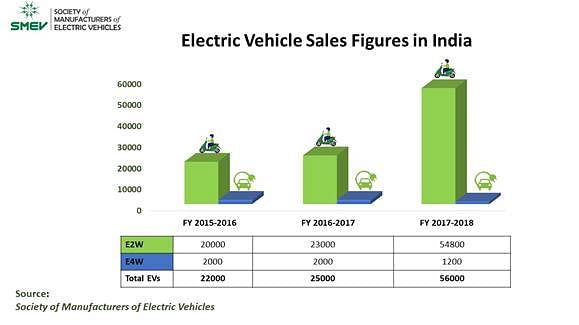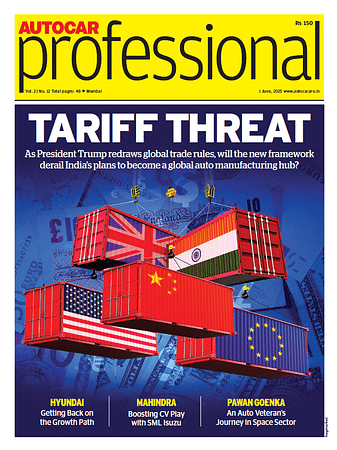EV sales in India grow to 56,000 units in FY2018, demand up for 2Ws but abysmal for PVs
For a market which saw sales of nearly 25 million vehicles in FY2017-18, electric vehicle sales are far from achieving their potential due to several challenges.
In FY2018, India sold a total of 24,972,788 vehicles across segments, barely 27,212 units shy of the 25-million units mark. They included 3.3 million passenger vehicles and 20.2 million two-wheelers, all running on fossil fuel. So the news today that FY2018 also saw sales of 56,000 electric vehicles (EVs) is proof enough that consumers are just not willing to spend their hard-earned money on electric motoring. At least right now.
For India, which is tipped to become the world’s third largest automobile market by 2021, the year-on-year growth of 124 percent, on a very low base in FY2017, from EVs (electric two- and four-wheelers) is shocking and points to the difficult road ahead for manufacturers and the country.

According to official data released by the Society of Manufacturers of Electric Vehicle (SMEV), while consumer demand for electric two-wheelers has grown sustainably, FY2018 saw de-growth in sale of electric four-wheelers whose sales are down year-on-year by 40 percent.
Commenting on the numbers, Sohinder Gill, Director Corporate Affairs, SMEV, said: “The EV industry has seen a decent leap in FY2017-2018, especially in the electric two-wheeler segment. The numbers indicate that citizens are accepting EVs as an economical as well as a cleaner mode of transportation in comparison to conventional vehicles. Most of the manufacturers have started using lithium-ion batteries, which has increased the performance of electric two-wheelers and helped in gaining consumer confidence. However, the absence of adequate finance mechanism, price gap between an electric two-wheeler and petrol two-wheeler, awareness among citizens are challenges, which need immediate redressal.”
In 2017, the government’s premiere think-tank body NITI Aayog along with Rocky Mountain Institute had come out with a report that said India had a ‘leapfrog’ opportunity to create a shared, electric, and connected mobility future promises to deliver clean, affordable, efficient, and reliable transportation options.
The report was seen as a vision which would be followed by a blueprint or a policy by the central and state government (s) to adopt electric mobility. Fast forward to the present day, while few states have announced or working on some policy it has yet to translate to any ground-result.
Commenting on the performance of electric cars, Gill said, “In the four-wheeler segment, lack of infrastructure, ambiguity over policy still remain the major deterrent which is holding the segment back.”
“This year also looks positive especially for the electric two-wheeler segment and we anticipate the sector to perform better than last year,” Gill said optimistically.
Also read: Can India take a leaf or two from Norway’s high-voltage EV strategy?
RELATED ARTICLES
Continental exits TBR market in India, shifts focus to car and SUV radials
German tyre manufacturer aims to tap the double-digit market growth opportunity for big SUV and luxury car tyres which w...
New ZF SELECT e-drive platform gives EV makers a choice in 100 to 300 kW range
Modular e-drive platform optimally matches 800-volt overall system and components such as the electric motor and power e...
Daimler India CV and BharatBenz deliver 200,000th truck
Daimler India Commercial Vehicles' portfolio includes truck models ranging from 10 to 55 tonnes for a wide variety of ap...





 18 Oct 2018
18 Oct 2018
 35765 Views
35765 Views





 Autocar Professional Bureau
Autocar Professional Bureau




